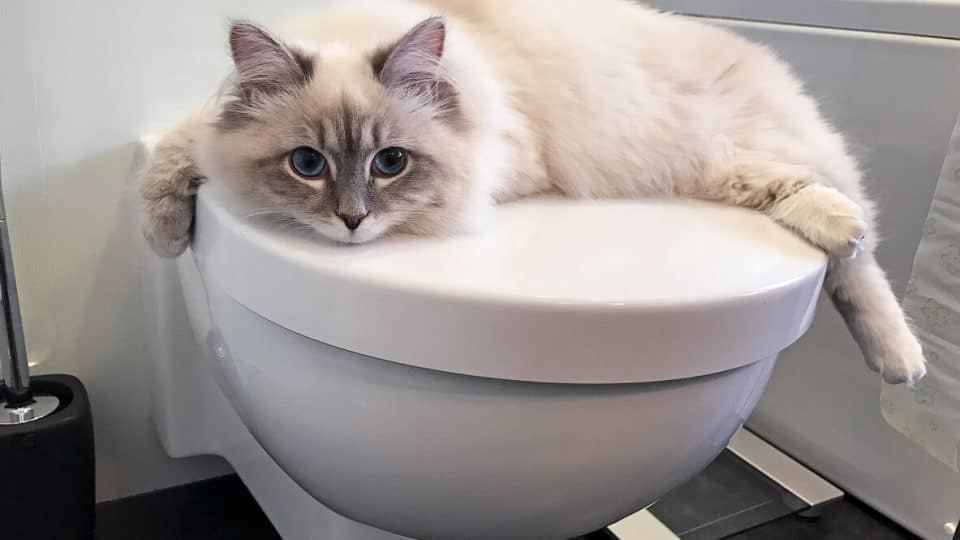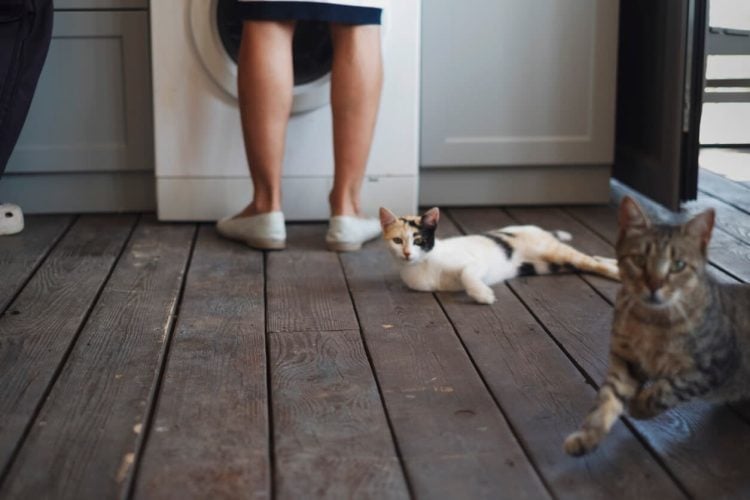- Not a substitute for professional veterinary help.
If you have clingy kitty who appoints themselves your full-time feline shadow, you might wonder if you should be flattered or concerned.
“A cat following their caregiver can be both a sign of a healthy bond and, less frequently, a symptom of underlying issues such as anxiety,” explains Dr. Kathryn Dench, veterinarian and owner of The Pets Kingdom. “Most cats follow their owners as a way of expressing affection and securing their presence, which is entirely normal and indicative of a strong attachment.”
Here’s how to tell why your cat is following you around, what it means, and what you should do about it.
7 Reasons Your Cat Follows You Everywhere
From medical reasons to emotional expression to a way to communicate needs, here are seven reasons why cats follow their favorite humans.
1. They love and trust you
Following behavior in cats isn’t always a sign of health problems or unmet needs. Often, it’s an expression of affection.
“When following is driven by affection and trust, it often manifests in more relaxed and less intrusive ways compared to attention-seeking,” says Dr. Dench. “It’s typically relaxed and intermittent.”
Because their behavior isn’t fueled by anxiety or insecurity, a love-motivated cat typically won’t bother you. “These cats may quietly accompany you from room to room, sitting nearby rather than on you,” Dr. Dench says. “It’s marked by calmness and a lack of distress.”
2. They want your attention
By contrast, a cat who follows you because they want your attention or interaction will make themselves known.
According to Dr. Dench, “This behavior is particularly common in younger or more socially active cats who thrive on interaction, especially in environments where they feel comfortable and stimulated.”
If your cat is following you for attention, play, or affection, they might nudge you with their nose, paw at you, bunt or head butt you, or rub up against you. You might also see increased meowing and vocalizations like chirps, trills, and purring.
3. They’re hungry
Another reason your cat might follow you around the house is because they’re hungry. If this is the reason, it’s usually not too hard to tell.
Some cats are quick to express that they’re famished with meows varying in intensity. “A hungry cat might walk to their food bowl, then back to you, repeatedly. This is their way of guiding you to the problem—an empty food bowl,” Dr. Alex Crow, MRCVS, a UK-based veterinarian says.
If the following behavior is food-motivated, look out for it to appear around meal times. You might also receive cat love-bombing with extra purrs and head bunts, or jumping up and pawing at you to get your attention.
4. They’re bored
Bored cats will often follow you around, and they aren’t typically shy about expressing themselves. If your cat is bored, their pursuit might have a sense of desperation and restlessness.
They’re eager to see something interesting happen, and sometimes they’ll take it into their own four paws and make it happen. That might include destructive scratching, knocking things over, unleashing a fierce case of the zoomies, yowling at the top of their lungs, or jumping onto counters.
-
Nils Jacobi via iStock
5. They’re stressed or anxious
“Anxiety, and particularly separation anxiety, can significantly influence a cat’s following behavior,” Dr. Dench says. Anxious cats typically follow their people to assure themselves of their caregiver’s presence. By shadowing your every step, these kitties cling to a sense of safety and security.
Unlike healthy following behavior, anxiety-driven cats who follow you around will often have distressed or excessive vocalization, restless movement, noticeable changes in appetite, and agitated body language like a hunched posture or swishing tail.
6. They’re sick
If there haven’t been any changes to your cat’s routine or disruptions to the household (like a new kitten or roommate) and they’ve suddenly decided to stick to you like glue, they might be sick or in pain.
“Several medical issues could cause a cat to follow their caregiver more than usual, including thyroid problems, hearing or vision loss, or cognitive dysfunction in older cats,” Dr. Dench explains.
Many of these conditions can make a cat feel more vulnerable or even confused and disoriented. They’ll seek comfort and reassurance by staying close to the people they love and trust most.
7. They’re pregnant or in heat
Following behavior in cats can also be fueled by hormones, especially in unspayed female cats.
“Heavily pregnant female cats tend to seek more constant proximity to their caregivers, displaying more following behavior than usual,” Dr. Dench says. “This is likely a natural instinct to ensure a safe environment for potential offspring.”
Female cats who are in heat can also become more cuddly and needy as a way to seek safety and comfort from the humans they love.
How To Respond To Your Cat
“If a caregiver suspects their cat’s following behavior is problematic, the first step should be a visit to a veterinarian to rule out any medical causes of the behavior, such as pain or sensory decline,” Dr. Dench recommends.
If your clingy kitty is healthy and has no underlying illnesses, their following is behavioral—which means your next step is to figure out what’s motivating them.
Here’s how to address some of the most common following behaviors.
How to handle a hungry following cat
Food-driven following behaviors are some of the easiest clingy kitty behaviors to curb.
Dr. Crow advises cat parents avoid giving in to their hungry kitty’s demands because it reinforces the unwanted behavior.
Dr. Lizzie Youens, MRCVS, a veterinary advisor for Cats.com, suggests establishing and sticking to a reliable mealtime routine so your cat won’t stress out about food availability. You can also consider adding slow feeders and puzzle toys to stretch out mealtimes and provide enrichment.
Note that it’s always a good idea to regularly monitor and be aware of your cat’s appetite. If your cat’s eating habits suddenly change, reach out to your vet to check for any medical conditions and get guidance on the right amount of food for your cat.
-
U.Ozel.Images via iStock
How to handle a pregnant following cat
If you have a pregnant kitty and her following behavior is driven by a desire for safety and comfort, you can give her an outlet for her nesting cravings. Dr. Youens suggests setting up a comfortable resting area with soft bedding and cat toys in a warm place.
Routines are also an effective tool for handling a pregnant or in-heat cat. Consistency with routine can help soothe their distress and reduce their desire to follow you.
You can also consider spaying your cat to cut back on in-heat following behavior.
How to handle an anxious or stressed following cat
Medication is an option for treating cat anxiety and stress, but it’s not a magic one-and-done solution. Many vets advise medication as a last resort, because it ultimately doesn’t target what’s causing the anxiety or stress to begin with.
It can be more effective to investigate what activity levels are breed-appropriate for your cat and what is essential for their mental and physical needs. “Implementing routines and providing environmental enrichment can help mitigate these behaviors by providing a sense of security and engagement for the anxious cat,” Dr. Dench advises.
You don’t have to do this sort of work entirely on your own either. Dr. Dench recommends working with a feline behaviorist to increase enrichment and target stressors.
How to handle an attention-seeking following cat
Attention-seeking in cats isn’t linked to only one cause. Some attention-seeking cats are bored, while others are more socially active and need more interaction with their favorite humans.
Bored cats who relentlessly follow you do best with more enrichment, like scratching posts, cat trees, and interactive toys. Scheduling in more playtime can also give a bored kitty an outlet for more destructive behaviors.
If you’re not able to play with your cat as much as they want, Amanda Caron, a cat behaviorist and founder of Frisky Feline Behavior Counseling, suggests adding an assortment of automatic or battery-operated toys to keep your kitty busy and entertained until you’re able to play with them again.
If your cat insists on following you everywhere just to spend time with you, Caron recommends offering them a better alternative to your keyboard. A window perch, cat shelves, and cat trees can give your kitty a chance to enjoy being up high and next to you, especially if you and your kitty work from home.
What If Random Cats Are Following You?
“Outdoor cats who previously had positive interactions with humans or may have once lived as a house cat may find safety and comfort in interactions with humans,” Caron says. “You might find that as a result, a community cat may follow a person even if they have never met before.”
If you’re being “scouted” by outdoor cats, Caron suggests letting them set the tone of the interaction. This is often as simple as them sniffing you and then going off to scope out the next thing that catches their interest.
Sometimes these cats, especially if they’re strays or free-roaming outdoor cats who have families taking care of them, might have more active and friendly interactions with you.
“Aim for short interactions and avoid moving too fast,” Caron says. Attempting to pick them up or pet them might be unappealing or seem threatening to a cat who barely knows you.





